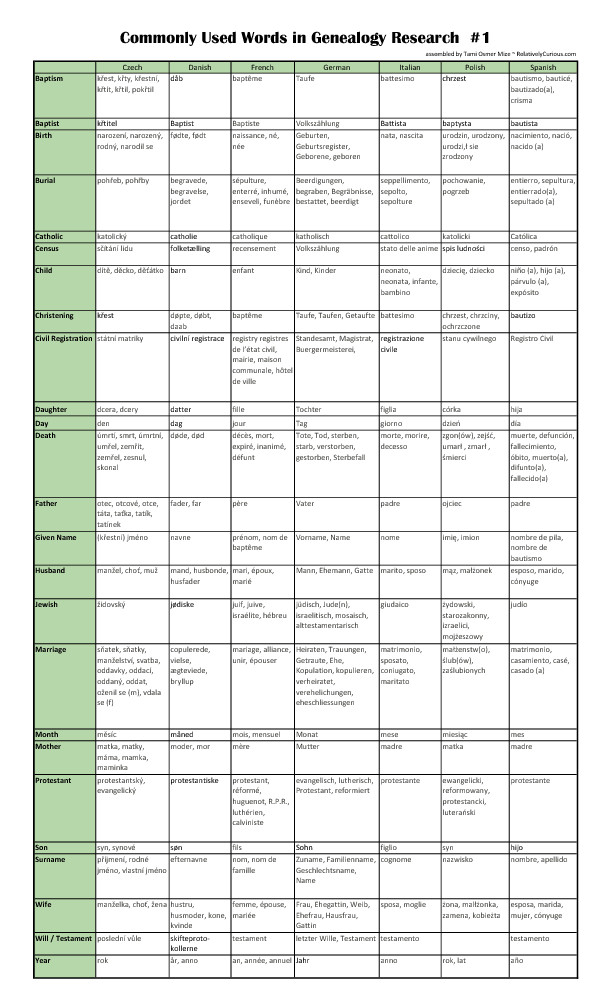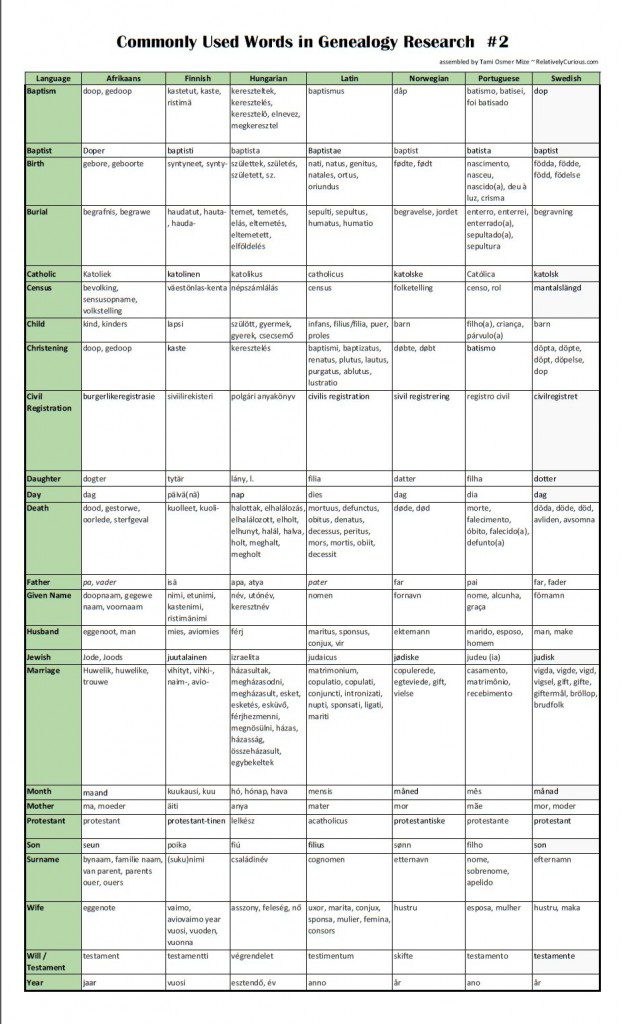Commonly Used Genealogy Words Translated
I’ve put together two pages of commonly used genealogy words translated into 14 languages (the same words, but 7 different languages on each page), of words that we tend to find often in our genealogy research. The translations may not be perfect, but they should be at least close enough to help you decipher records written in another language. You may download these by clicking on the image, and the PDF document should fit nicely on 8-1/2 x 14″ (legal) paper. I hope you find these helpful 🙂
*UPDATED WITH A FEW CORRECTIONS ON 7/30/15
Please feel free to download these charts and share them with others. If, however, you’d like to show your gratitude by tossing coins my way, please feel free to do that too by using the PayPal button below:






I believe there is an error in the French Column, the words for Will / Testament are the same for Year.
Thanks in advance
Maria
Thank you Maria! I’ve corrected the PDF download (although the jpeg image placeholder currently still shows the error). ~tami
I love the fact that you have done this list!!! Unfortunately, when I download and print it the document is too blurry to read. Could you possible email it direct.
Thanks in advance
Jane
Hi Jane, rather than printing from the images in the post, if you click on each document, it should bring them up in PDF form, which should print clearly. If you have any trouble with it, email me at relativelycurious@gmail.com, and I’ll be happy to email those PDFs directly. ~tami
Thanks! Very handy indeed. Should go up on many walls.
A few fixes in the German column:
–Son = Sohn
–Day = Tag (not day!)
–be careful to capitalize nouns and only nouns!
–other words for Jewish: mosaisch (very common in civil vital records); alttestamentarisch (not so common, but fun)
–important Protestant denomination: reformiert
–last will: also Testament
–civil registration (also registry office–cf. French column): also Magistrat, Buergermeisterei, etc.
Also, you might consider adding rows for Ancestor and Descendant.
Thank you so much, Roger. I’ve made the suggested corrections, and really appreciate the suggestions!
Other common words to consider if you ever do a 2nd page: witness, week, family, aunt, uncle, cousin, grandfather, stepmother, etc.
After reading the comments above, I think I am missing a page. My sheet#1 does not have any words after m for Mother….I don’t have son, last will etc. i am interested in the German words.
Hi Joan – It’s set up on legal size paper format – 8.5×14, and looks like Mother hits at about the 11″ spot. Could that be the problem?
Dear Tami,
Some corrections for you to consider. You should change the Danish word you have for “wills” to “skifteprotokollerne”. There are very few wills in Denmark (upper class only). Skifteprotokollerne translates as probate/inventory. There are many more of these for the lower classes. In the Swedish word list change the word for census (mantalslängd) to husförhörslängd. Mantalslängd is actually a tax list, while husförhörslängd is a household census which was kept by the Lutheran minister. These corrections will make your word lists more accurate. You’re welcome!
R. Erickson
Thank you so very much Ralph! I will gladly make those changes shortly. I really do appreciate getting the ‘skinny’ from folks that are more fluent in the languages, for sure!!
Dear Tami,
One more correction for the Swedish word list. The correct term for wills is Bouppteckning. Again, wills apply to the upper class only. In the case for most of the lower classes, a household inventory was conducted following a death. These inventories of personal effects were know as “bouppteckning”. This is a better choice than the word you have currently in your word list. You’re welcome.
Ralph Erickson
Thank you again for your thoughtful replies, Ralph. I am fixing these right now.
Hi Tami,
Thank you for doing this. Very useful for the occasional dabbler into non-English language records. In the Italian column Baptist should be Battista. Battezzatore means baptizer. Also under marriage, it is matrimonio with an i.
Polly
Thanks so much Polly! I’m fixing/updating it right now!
Dear Tami,
I write one last time. I don’t wish to be thought of as a nit-picker. In the Norwegian list, I believe the Norwegian word for marriage is either ekteviede or aegteviede. In the Norwegian alphabet the last three letters after Z are
Å, AE, and O with a slanted line. I don’t believe it is correct to write egteviede. I believe you must use either ekteviede or aegteviede. I hope this helps.
Ralph Erickson
I’m a bit late to the party but have some evidence that bears on this comment. I’m looking at images of a turn-of-the-century church-book from Our Saviour’s Lutheran Church in Brooklyn, NY. The marriage pages are headed with gothic script and entitled “egteviede.” A quick web search will turn up plenty of examples of this spelling, along with uses of “ægteviede.”